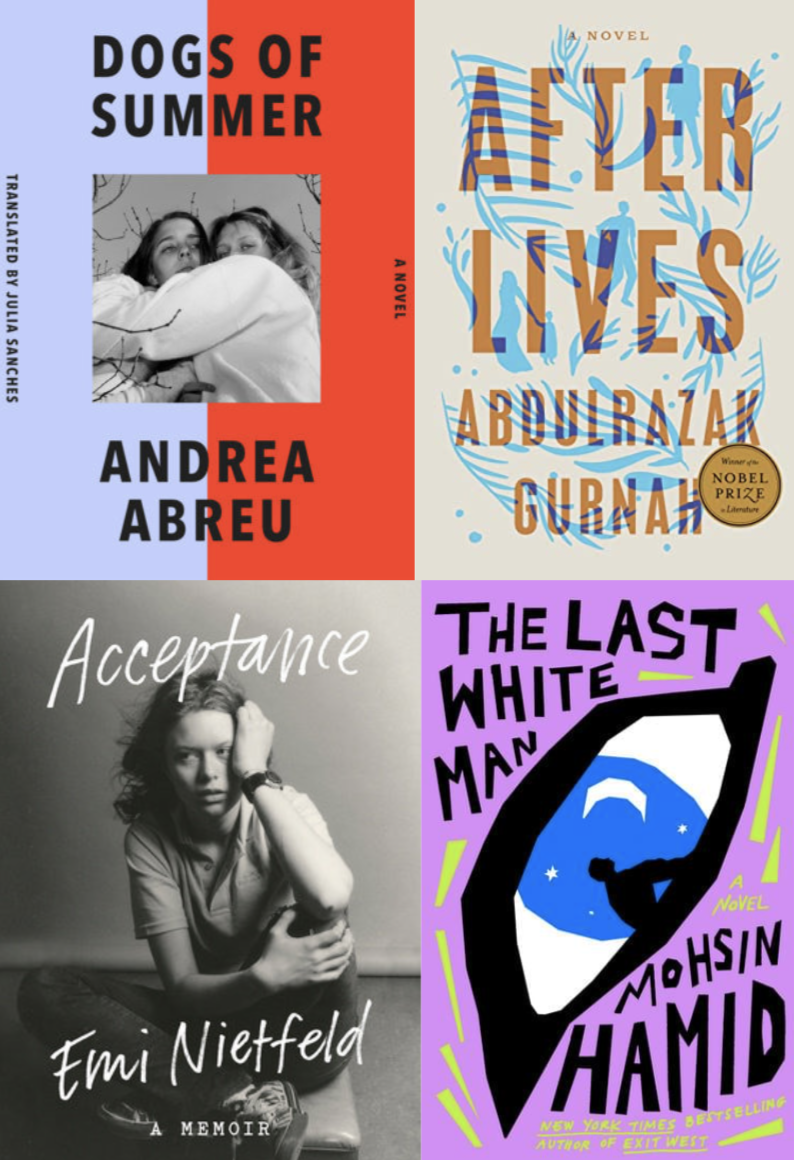We wouldn’t dream of abandoning our vast semi–annual Most Anticipated Book Previews, but we thought a monthly reminder would be helpful (and give us a chance to note titles we missed the first time around). Here’s what we’re looking out for this month. Let us know what you’re looking forward to in the comments!
Want to know about the books you might have missed? Then go read our most recent book preview. Want to help The Millions keep churning out great books coverage? Then sign up to be a member today.
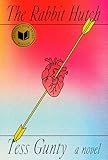 The Rabbit Hutch by Tess Gunty: In Gunty’s debut novel, four teenagers formerly in the foster care system live in a run-down apartment building nicknamed the Rabbit Hutch. The novel expands and contracts temporally and spatially as Gunty delves into the lives, desires, dreams, and fates of the building’s residents. Mark Z. Danielewski says: “The Rabbit Hutch aches, bleeds, and even scars but it also forgives with laughter, with insight, and finally, through an act of generational independence that remains this novel’s greatest accomplishment, with an act of rescue, rescue of narrative, rescue from ritual, rescue of heart, the rescue of tomorrow.” (Carolyn)
The Rabbit Hutch by Tess Gunty: In Gunty’s debut novel, four teenagers formerly in the foster care system live in a run-down apartment building nicknamed the Rabbit Hutch. The novel expands and contracts temporally and spatially as Gunty delves into the lives, desires, dreams, and fates of the building’s residents. Mark Z. Danielewski says: “The Rabbit Hutch aches, bleeds, and even scars but it also forgives with laughter, with insight, and finally, through an act of generational independence that remains this novel’s greatest accomplishment, with an act of rescue, rescue of narrative, rescue from ritual, rescue of heart, the rescue of tomorrow.” (Carolyn)
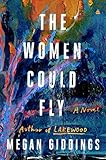 The Women Could Fly by Megan Giddings: The Women Could Fly is set in an oppressive society in which witch trials occur and the State mandates women to marry at 30 or relinquish their autonomy. Josephine Thomas is almost 30 and ambivalent about marriage, but more concerned about her mother who disappeared more than ten years ago. The Women Could Fly has been compared to work by Octavia E. Butler, Shirley Jackson, and Margaret Atwood. As Alexandra Kleeman describes, “Born of a radical imagination and executed with piercing elegance and skill, The Women Could Fly recalls legendary works of dystopian fiction but casts a spell all its own. Giddings is a rare and utterly original voice bridging the speculative and the all-too-real.” (Zoë)
The Women Could Fly by Megan Giddings: The Women Could Fly is set in an oppressive society in which witch trials occur and the State mandates women to marry at 30 or relinquish their autonomy. Josephine Thomas is almost 30 and ambivalent about marriage, but more concerned about her mother who disappeared more than ten years ago. The Women Could Fly has been compared to work by Octavia E. Butler, Shirley Jackson, and Margaret Atwood. As Alexandra Kleeman describes, “Born of a radical imagination and executed with piercing elegance and skill, The Women Could Fly recalls legendary works of dystopian fiction but casts a spell all its own. Giddings is a rare and utterly original voice bridging the speculative and the all-too-real.” (Zoë)
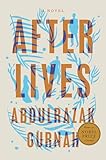 Afterlives by Abdulrazak Gurnah: Nobel laureate Gurnah’s latest is a multi-generational exploration of colonial violence and displacement in east Africa through the lives of three young people: siblings Ilyas and Afiya—who are endlessly brutalized by family, country, and war—and Hamza, a fellow townsperson who, upon his return from war, falls in love with Afiya. Phil Klay says: “A work of extraordinary power, giving us a colonial world with utmost intimacy, capturing its cruelties and complexities, immersing us in vividly evoked characters, showing us moments of incredible tenderness and beauty, and quietly reordering our sense of history.” (Carolyn)
Afterlives by Abdulrazak Gurnah: Nobel laureate Gurnah’s latest is a multi-generational exploration of colonial violence and displacement in east Africa through the lives of three young people: siblings Ilyas and Afiya—who are endlessly brutalized by family, country, and war—and Hamza, a fellow townsperson who, upon his return from war, falls in love with Afiya. Phil Klay says: “A work of extraordinary power, giving us a colonial world with utmost intimacy, capturing its cruelties and complexities, immersing us in vividly evoked characters, showing us moments of incredible tenderness and beauty, and quietly reordering our sense of history.” (Carolyn)
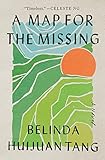 A Map for the Missing by Belinda Huijuan Tang: After years of living in the US, Tang Yitian receives a phone call from his mother: his father has disappeared from their native rural village in China. Yitian’s homecoming results in not only revealing the mystery of his family, but also a confrontation with a choice he made in his youth. Both he and his childhood friend Tian Hanwen made great efforts in trying to attend university in the city. But while Yitian successfully rose to a professorship in the US, Hanwen was left behind, becoming the housewife of a local bureaucrat. A Map for the Missing delves into China’s political landscape in recent decades and examines the price of making your own life decision. (Jianan Qian)
A Map for the Missing by Belinda Huijuan Tang: After years of living in the US, Tang Yitian receives a phone call from his mother: his father has disappeared from their native rural village in China. Yitian’s homecoming results in not only revealing the mystery of his family, but also a confrontation with a choice he made in his youth. Both he and his childhood friend Tian Hanwen made great efforts in trying to attend university in the city. But while Yitian successfully rose to a professorship in the US, Hanwen was left behind, becoming the housewife of a local bureaucrat. A Map for the Missing delves into China’s political landscape in recent decades and examines the price of making your own life decision. (Jianan Qian)
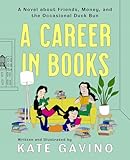 A Career in Books by Kate Gavino: In this graphic novel, recent NYU grads Silvia Bautista, Nina Nakamura, and Shirin Yap are roommates and friends who work in the publishing industry. They discover that Veronica Vo, their neighbor, is a Booker Prize winner whose books are out of print, and they take action to reissue her work. Booklist praises A Career in Books, stating that “While Gavino empathically showcases independent APA women in search of fulfillment, she also lovingly celebrates Asian American publishing with clever inclusions…Presented in delightful four-part, black-and-white panels, Gavino’s memorable characters manage the quotidian, dissect challenges, navigate change, and celebrate triumphs—together.” (Zoë)
A Career in Books by Kate Gavino: In this graphic novel, recent NYU grads Silvia Bautista, Nina Nakamura, and Shirin Yap are roommates and friends who work in the publishing industry. They discover that Veronica Vo, their neighbor, is a Booker Prize winner whose books are out of print, and they take action to reissue her work. Booklist praises A Career in Books, stating that “While Gavino empathically showcases independent APA women in search of fulfillment, she also lovingly celebrates Asian American publishing with clever inclusions…Presented in delightful four-part, black-and-white panels, Gavino’s memorable characters manage the quotidian, dissect challenges, navigate change, and celebrate triumphs—together.” (Zoë)
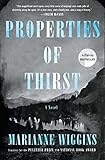 Properties of Thirst by Marianne Wiggins: Pulitzer Prize and National Book Award finalist Wiggins returns with a novel about the Rhodes family. Set against the backdrop of World War II, Rocky Rhodes, the patriarch, mourns the death of his wife, protects his California ranch, and his children, Sunny and Stryker. When the war brings itself to their front door, the Rhodes family must navigate their ways through love, loss, and personal and national tragedies. Kirkus’ starred review writes: “This majestic novel will satisfy those thirsting for an epic saga of love, family, and the complexities of the American way.” (Carolyn)
Properties of Thirst by Marianne Wiggins: Pulitzer Prize and National Book Award finalist Wiggins returns with a novel about the Rhodes family. Set against the backdrop of World War II, Rocky Rhodes, the patriarch, mourns the death of his wife, protects his California ranch, and his children, Sunny and Stryker. When the war brings itself to their front door, the Rhodes family must navigate their ways through love, loss, and personal and national tragedies. Kirkus’ starred review writes: “This majestic novel will satisfy those thirsting for an epic saga of love, family, and the complexities of the American way.” (Carolyn)
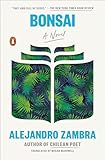 Bonsai by Alejandro Zambra (translated by Megan McDowell): This latest addition to the translated work of the author of the fabulous “Chilean Poet” is described by the Chilean press (Capital) as “Brief as a sigh and forceful as a blow.” Deceptively simple, this profound tale of ephemeral love will, despite the brevity of the telling, haunt you. (Il’ja)
Bonsai by Alejandro Zambra (translated by Megan McDowell): This latest addition to the translated work of the author of the fabulous “Chilean Poet” is described by the Chilean press (Capital) as “Brief as a sigh and forceful as a blow.” Deceptively simple, this profound tale of ephemeral love will, despite the brevity of the telling, haunt you. (Il’ja)
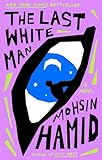 The Last White Man by Mohsin Hamid: A speculative imagining of widespread racial “turnover,” the novel takes its inspiration from Kafka’s The Metamorphosis and adapts/shapes it for our times: “One morning Anders, a white man, woke up to find he had turned a deep and undeniable brown.” It turns out Anders is not alone. Havoc and reckonings of all kinds–– interpersonal, societal, psycho-emotional – ensue. (Sonya)
The Last White Man by Mohsin Hamid: A speculative imagining of widespread racial “turnover,” the novel takes its inspiration from Kafka’s The Metamorphosis and adapts/shapes it for our times: “One morning Anders, a white man, woke up to find he had turned a deep and undeniable brown.” It turns out Anders is not alone. Havoc and reckonings of all kinds–– interpersonal, societal, psycho-emotional – ensue. (Sonya)
 Dogs of Summer by Andrea Abreu (translated by Julia Sanches): This lyrical novel is set in a working-class neighborhood in Tenerife, far from the Canary Islands’ posh resorts. During one oppressively hot summer, the 10-year-old narrator and her best friend Isora experience changes in their bodies and their volatile emotions — from love to jealousy, admiration, obsession and submission. The story, laced with Canary Islands dialect and bachata lyrics, builds to a crescendo when desire and violence fuse. (Bill)
Dogs of Summer by Andrea Abreu (translated by Julia Sanches): This lyrical novel is set in a working-class neighborhood in Tenerife, far from the Canary Islands’ posh resorts. During one oppressively hot summer, the 10-year-old narrator and her best friend Isora experience changes in their bodies and their volatile emotions — from love to jealousy, admiration, obsession and submission. The story, laced with Canary Islands dialect and bachata lyrics, builds to a crescendo when desire and violence fuse. (Bill)
 Bad Fruit by Ella King: In her debut novel, King follows 18-year-old Lily is spending her last summer before Oxford under the control and surveillance of her abusive mother May. As May’s mental health worsens, Lily begins to have traumatic flashbacks that don’t belong to her—and begins to unravel the secrets that shrouded their family. Lidia Yuknavitch calls the novel “breathtaking” and says “Ella King opens up the fraught space between mother and daughter to reveal both the unbearable weight of inherited traumas as well as the uncontainable desire of a heart reaching for life.” (Carolyn)
Bad Fruit by Ella King: In her debut novel, King follows 18-year-old Lily is spending her last summer before Oxford under the control and surveillance of her abusive mother May. As May’s mental health worsens, Lily begins to have traumatic flashbacks that don’t belong to her—and begins to unravel the secrets that shrouded their family. Lidia Yuknavitch calls the novel “breathtaking” and says “Ella King opens up the fraught space between mother and daughter to reveal both the unbearable weight of inherited traumas as well as the uncontainable desire of a heart reaching for life.” (Carolyn)
 Mercury Pictures Presents by Anthony Marra: The newest novel by National Book Award nominee and NBCC John Leonard Prize Winner Marra (The Tsar of Love and Techno) follows Maria Lagana, a young woman who leaves Italy for Los Angeles with her mother in the decade before World War II. When the United States enters the war fifteen years later, Maria—who has carefully crafted a life free of her family’s transgressions—works as an associate producer at Mercury Pictures, and soon finds her past, present, and future colliding in life-changing ways. Celeste Ng says: “Crackling with wit and suffused with insight, Anthony Marra’s new novel is as epic in sweep as a movie set yet delineates the inner workings of the human heart with a miniaturist’s precision.” (Carolyn)
Mercury Pictures Presents by Anthony Marra: The newest novel by National Book Award nominee and NBCC John Leonard Prize Winner Marra (The Tsar of Love and Techno) follows Maria Lagana, a young woman who leaves Italy for Los Angeles with her mother in the decade before World War II. When the United States enters the war fifteen years later, Maria—who has carefully crafted a life free of her family’s transgressions—works as an associate producer at Mercury Pictures, and soon finds her past, present, and future colliding in life-changing ways. Celeste Ng says: “Crackling with wit and suffused with insight, Anthony Marra’s new novel is as epic in sweep as a movie set yet delineates the inner workings of the human heart with a miniaturist’s precision.” (Carolyn)
 Acceptance by Emi Nietfeld: Writer and software engineer Nietfeld’s memoir offers an absorbing and clear-eyed view into her dysfunctional childhood—including living with her mother, who was a hoarder; navigating homelessness and foster care; and her own mental health struggles—and how she made her way out (for better or worse) onto the other side to achieve societal “success.” Kirkus’ starred review writes: “The author offers a complex meditation on desperation, leveraging personal pain, and how the drive to achieve can be a gift and a pathology simultaneously.” (Carolyn)
Acceptance by Emi Nietfeld: Writer and software engineer Nietfeld’s memoir offers an absorbing and clear-eyed view into her dysfunctional childhood—including living with her mother, who was a hoarder; navigating homelessness and foster care; and her own mental health struggles—and how she made her way out (for better or worse) onto the other side to achieve societal “success.” Kirkus’ starred review writes: “The author offers a complex meditation on desperation, leveraging personal pain, and how the drive to achieve can be a gift and a pathology simultaneously.” (Carolyn)
 Diary of a Void by Emi Yagi (translated by David Boyd and Lucy North): Winner of the Dazai Osamu Prize, Yagi’s debut novel follows 34-year-old Shibta as she comes up with a clever way of getting out of doing women’s labor in the workplace: She tells everyone she’s pregnant. As time goes on, Shibta becomes lost in the attention, relaxation, and routine of her fake pregnancy—and soon the lines between reality and fantasy become increasingly, and hilariously, blurred. Publishers Weekly’s starred review writes: “Absurdist, amusing and clever, the story brings subtlety and tact to its depiction of workplace discrimination—as well as a touch of magic.” (Carolyn)
Diary of a Void by Emi Yagi (translated by David Boyd and Lucy North): Winner of the Dazai Osamu Prize, Yagi’s debut novel follows 34-year-old Shibta as she comes up with a clever way of getting out of doing women’s labor in the workplace: She tells everyone she’s pregnant. As time goes on, Shibta becomes lost in the attention, relaxation, and routine of her fake pregnancy—and soon the lines between reality and fantasy become increasingly, and hilariously, blurred. Publishers Weekly’s starred review writes: “Absurdist, amusing and clever, the story brings subtlety and tact to its depiction of workplace discrimination—as well as a touch of magic.” (Carolyn)
 Cat Brushing by Jane Campbell: In her debut collection, Campbell explores the desires, ambitions, intimacies, regrets, and struggles of thirteen older women, who—at the end of their lives—show us how much more they have to give, love, and live. Darcey Steinke writes: “Jane Campbell’s Cat Brushing is the debut of the decade, an eighty year old woman laying out the physical and spiritual struggle of life at its very end. I was haunted by these stories of older women falling, having strokes, dying–subjects often flattened into sentimentality–but in Campbell’s hands made both elegant and transgressive. We are striving creatures of intense desire, Campbell insists, until we are not.” (Carolyn)
Cat Brushing by Jane Campbell: In her debut collection, Campbell explores the desires, ambitions, intimacies, regrets, and struggles of thirteen older women, who—at the end of their lives—show us how much more they have to give, love, and live. Darcey Steinke writes: “Jane Campbell’s Cat Brushing is the debut of the decade, an eighty year old woman laying out the physical and spiritual struggle of life at its very end. I was haunted by these stories of older women falling, having strokes, dying–subjects often flattened into sentimentality–but in Campbell’s hands made both elegant and transgressive. We are striving creatures of intense desire, Campbell insists, until we are not.” (Carolyn)
 Enjoy Me Among My Ruins by Juniper Fitzgerald: Fitzgerald’s experimental debut memoir defies genre as she crafts a bricolage of her life from conjured childhood memories, excerpted childhood letters to Gillian Anderson, and her life as a sex worker, mother, and queer academic. Chris Belcher writes: “Haunting and powerful, Enjoy Me among My Ruins traverses the American West and Midwest, conjuring the women and queers who have been forces in Fitzgerald’s life, and asking them to come along on her journey to destroy the contradictions of heteropatriarchy and dance upon its grave.” (Carolyn)
Enjoy Me Among My Ruins by Juniper Fitzgerald: Fitzgerald’s experimental debut memoir defies genre as she crafts a bricolage of her life from conjured childhood memories, excerpted childhood letters to Gillian Anderson, and her life as a sex worker, mother, and queer academic. Chris Belcher writes: “Haunting and powerful, Enjoy Me among My Ruins traverses the American West and Midwest, conjuring the women and queers who have been forces in Fitzgerald’s life, and asking them to come along on her journey to destroy the contradictions of heteropatriarchy and dance upon its grave.” (Carolyn)
 Ex-Members by Tobias Carroll: Writer, critic, and Vol. 1 Brooklyn managing editor Carroll’s (Political Sign) newest novel is about a hardcore band, northwestern New Jersey, friends-turned-enemies, the underground punk scene, unearthed secrets, and the hometowns that equally repeal and reel us back in. Chris L. Terry says: “Tobias Carroll has crafted a touching, quietly devastating novel about the triumphs and tragedies of chasing your dreams with your friends.” (Carolyn)
Ex-Members by Tobias Carroll: Writer, critic, and Vol. 1 Brooklyn managing editor Carroll’s (Political Sign) newest novel is about a hardcore band, northwestern New Jersey, friends-turned-enemies, the underground punk scene, unearthed secrets, and the hometowns that equally repeal and reel us back in. Chris L. Terry says: “Tobias Carroll has crafted a touching, quietly devastating novel about the triumphs and tragedies of chasing your dreams with your friends.” (Carolyn)
 Autoportrait by Jesse Ball: The first memoir from ever-prolific writer and poet Ball (The Divers’ Game) shares a name with and is inspired by French writer Édouard Levé’s Autoportrait. The slim yet deeply alive book flows from one idea to the next—from the ordinary to the extraordinary—in one unbreaking and unflinching paragraph. Kirkus calls the memoir “a hypnotic personal reflection penned with clockwork discipline.” (Carolyn)
Autoportrait by Jesse Ball: The first memoir from ever-prolific writer and poet Ball (The Divers’ Game) shares a name with and is inspired by French writer Édouard Levé’s Autoportrait. The slim yet deeply alive book flows from one idea to the next—from the ordinary to the extraordinary—in one unbreaking and unflinching paragraph. Kirkus calls the memoir “a hypnotic personal reflection penned with clockwork discipline.” (Carolyn)
